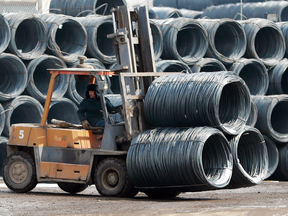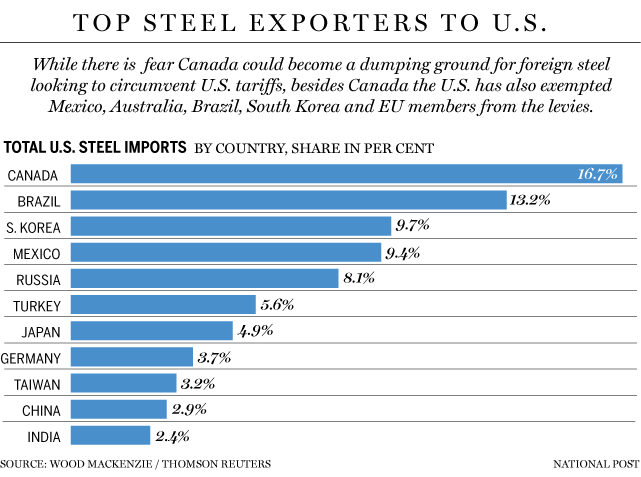Fearing a flood of steel, Canada bolsters borders to avoid becoming world’s dumping ground
Canada gives border security extra powers to crack down on cheap steel, aluminum amid U.S. tariffs

Article content
Canadian steel producers, government officials and other stakeholders are giving the Canada Border Services Agency extra powers and have formed an urgent working group tasked with heading off a possible flood of foreign steel into Canada as a result of tariffs imposed by the United States.
We’re coming together out of a recognition that these are extraordinary times
Canada is among the six countries that secured exemptions from U.S. President Donald Trump’s tariffs of 25 per cent on steel and 10 per cent on aluminum, which came into effect Friday. But domestic producers remain concerned that the tariffs will prompt a diversion of steel from foreign producers into the Canadian market.
The newly formed committee, which will meet in Ottawa for the first time Wednesday, will discuss strategies for improved monitoring and enforcement of trade laws, said Joe Galimberti, president of the Canadian Steel Producers Association (CSPA).
“We’re coming together out of a recognition that these are extraordinary times,” he said. “We don’t have a blanket tariff (on imports) like the United States so there is a risk of imported steel which was bound for the U.S. being diverted into Canada’s domestic market. This is something we have discussed with the government extensively and look for the government to address very, very seriously with the tools at their disposal.”
The “steel trade monitoring committee” will include representatives from federal, provincial and territorial governments as well from labour unions and the steel industry, Finance Canada said in an emailed statement.
Canada Border Services Agency is being granted extra powers to identify businesses that try to dodge import duties and more flexibility to determine whether prices in countries of origin are reliable or distorted.
Beginning in mid-April, unions will also be allowed to take part in trade-remedy proceedings, including at the Canadian International Trade Tribunal, into whether foreign exports hurt domestic producers.
Canada will not be used as a backdoor into other North American markets
Justin Trudeau
A similar group to address trade in the aluminum industry will also be established, the department said, noting the importance of working collaboratively to share information on trade and “ensure the government can act to address potential steel diversion.”
Canada is a trading nation, and we will not allow North American industries to be hurt or threatened by unfair trade practices, like the diversion of steel and aluminum, Prime Minister Justin Trudeau said in a statement. “Our businesses and workers rely on our integrated industries, and we will take strong action to defend and protect our most important trade relationships. Canada will not be used as a backdoor into other North American markets.”
The European Commission initiated a safeguard investigation on Monday in response to the U.S. restrictions on steel and aluminum, stating that its surveillance system had provided evidence that imports of certain steel products have been increasing.
Though it did not say where the imports were coming from, “the trend may be even stronger now that the access to the U.S. market has been limited and steel products from other parts of the world previously destined to the U.S. may be redirected to Europe, disturbing the market and skewing prices,” the commission said in a release.
The investigation, likely to take nine months, could result in “the imposition of import tariffs or quotas that would shield EU producers from excessive imports, if this proves necessary,” the release said.
The trend may be even stronger now that the access to the U.S. market has been limited and steel products from other parts of the world … disturbing the market and skewing prices
European Commission
Government-initiated safeguards are among the measures that the CSPA has already discussed with the government, Galimberti said. The association has not, at this point, asked for a blanket tariff on all steel imports.
“I would not say we are looking to do the same as the EU because our trade remedy system is different, the whole thing is apples and oranges,” he said. “We are having discussions about the government initiating targeted safeguards where appropriate in Canada, or taking targeted trade cases where appropriate.”
World Trade Organization rules allow for countries to take emergency safeguard action against imports if they cause serious injury, said John Weekes, Canada’s former WTO ambassador and chief negotiator on the original NAFTA agreement.
Applying import licensing to a wide range of products rather than waiting for trade statistics, would also be helpful in providing more immediate information on the movement of goods into the country, he said.
“That would be a much surer method of determining what’s happening,” he said.
Meanwhile Trump has ramped up pressure on the renegotiation of the North American Free Trade Agreement, saying Canada and Mexico’s exemptions from the steel and aluminum tariffs will expire May 1 if he’s not satisfied with the talks.
Prime Minister Justin Trudeau spoke with U.S. President Donald Trump by phone Monday, emphasizing the strong measures Canada is taking to address unfair trade in aluminum and steel.
With files from The Canadian Press
• Email: npowell@nationalpost.com | Twitter: Naomi_Powell










Postmedia is committed to maintaining a lively but civil forum for discussion. Please keep comments relevant and respectful. Comments may take up to an hour to appear on the site. You will receive an email if there is a reply to your comment, an update to a thread you follow or if a user you follow comments. Visit our Community Guidelines for more information.